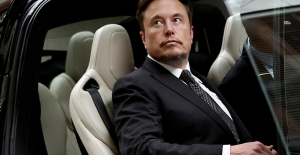How will Germany achieve the targeted greenhouse gas neutrality? At European level, one answer is that cars with petrol and diesel engines will no longer be registered from 2035. According to the will of the Ministry of Economics under Robert Habeck (Greens), the installation of new gas and oil heating systems should be banned nationally from next year. Within the traffic light coalition, the plans met with resistance, especially in the ranks of the FDP.
"Is that really well thought out?" Anne Will also asked the politicians Stephan Weil (SPD), Omid Nouripour (Greens), Christian Dürr (FDP) and Gitta Connemann (CDU) as well as Henrike Roßbach from the parliamentary office of the "Süddeutsche Zeitung" on Sunday evening.
He was "at times irritated" by the debate about the heaters, Nouripour explained. "What is permanent remains permanent." When it comes to climate protection, the question of speed is "neuralgic". However, the change to the heat pump only works with a subsidy program, the Greens politician conceded. "Climate protection only works with the people - not against them," said CDU politician Connemann in response to the Greens' plans.
There is a lack of electricity, heat pumps and installers. For the necessary heat transition, the government must rely more on emissions trading, provide money for building renovations and promote nuclear power.
The FDP has also always fought very hard for emissions trading and wants to "extend it completely to the building sector" in 2027, emphasized Christian Dürr. In addition to the installation of heat pumps, he called for staying "open to technology".
For example, there are gas heaters that are “H₂Ready”, i.e. that can be operated with climate-neutral hydrogen in the future. The FDP parliamentary group leader repeatedly emphasized that Habeck's draft was "obviously incomplete" and had to "go back to the assembly hall". It makes no sense to break the law over the knee, subsidize the conversion with tax money and thus overwhelm “private and federal budgets”.
In the debate about the end of the combustion engine, Stephan Weil positioned himself against e-fuels. Although synthetic fuels are "very appealing", they require "a lot of renewable energy" and generate higher costs.
Large automotive companies have therefore already “set the course very clearly” for battery-powered electromobility. Accordingly, the advance of the FDP "is not accompanied by enthusiasm from the affected industry".
Rather, the discussion triggers "confusion". Anne Will countered that last August, Porsche manager Oliver Blume praised e-fuels as a "sensible addition to electromobility". Gitta Connemann agreed with this attitude. Even if the coalition were to achieve its goals for e-mobility by 2030, 30 million combustion engines would still be driving in Germany alone, she said. For this old stock, e-fuels are “absolutely” necessary.
Omid Nouripour highlighted other uses for synthetic fuels. They are "totally useful" in shipping and air traffic. In road traffic, on the other hand, they were not profitable because they required “eight times the electricity” to produce the same power as an electric motor. Christian Dürr, on the other hand, insisted on keeping the internal combustion engine. On Monday evening, however, both were confident of finding an agreement
This demonstrative solidarity was not able to hide the differing views of the FDP and the Greens. Henrike Roßbach made it clear: After the "acute crisis period of the first few months", the "fundamental differences" are now becoming visible, which above all concern the "role of the state".
While the FDP is about incentives and “little state”, according to the journalist, the SPD and the Greens believe in redistribution and “a much more active role for the state in terms of regulatory policy”. The budget dispute is just a "symptom" of it. And it is good that he is being guided: "The course must now be set and decided: Where are we going?"
"Kick-off Politics" is WELT's daily news podcast. The most important topic analyzed by WELT editors and the dates of the day. Subscribe to the podcast on Spotify, Apple Podcasts, Amazon Music, among others, or directly via RSS feed.

 B:SM will break its investment record this year with 62 million euros
B:SM will break its investment record this year with 62 million euros War in Ukraine: when kyiv attacks Russia with inflatable balloons loaded with explosives
War in Ukraine: when kyiv attacks Russia with inflatable balloons loaded with explosives United States: divided on the question of presidential immunity, the Supreme Court offers respite to Trump
United States: divided on the question of presidential immunity, the Supreme Court offers respite to Trump Maurizio Molinari: “the Scurati affair, a European injury”
Maurizio Molinari: “the Scurati affair, a European injury” Irritable bowel syndrome: the effectiveness of low-carbohydrate diets is confirmed
Irritable bowel syndrome: the effectiveness of low-carbohydrate diets is confirmed Beware of the three main sources of poisoning in children
Beware of the three main sources of poisoning in children First three cases of “native” cholera confirmed in Mayotte
First three cases of “native” cholera confirmed in Mayotte Meningitis: compulsory vaccination for babies will be extended in 2025
Meningitis: compulsory vaccination for babies will be extended in 2025 When traveling abroad, money is a source of stress for seven out of ten French people
When traveling abroad, money is a source of stress for seven out of ten French people Elon Musk arrives in China to negotiate data transfer and deployment of Tesla autopilot
Elon Musk arrives in China to negotiate data transfer and deployment of Tesla autopilot Patrick Pouyanné, CEO of TotalEnergies, is very reserved about the rapid growth of green hydrogen
Patrick Pouyanné, CEO of TotalEnergies, is very reserved about the rapid growth of green hydrogen In the United States, a Boeing 767 loses its emergency slide shortly after takeoff
In the United States, a Boeing 767 loses its emergency slide shortly after takeoff A charred papyrus from Herculaneum reveals its secrets about Plato
A charred papyrus from Herculaneum reveals its secrets about Plato The watch of the richest passenger on the Titanic sold for 1.175 million pounds at auction
The watch of the richest passenger on the Titanic sold for 1.175 million pounds at auction Youn Sun Nah: jazz with nuance and delicacy
Youn Sun Nah: jazz with nuance and delicacy Paris Globe, a new international theater festival
Paris Globe, a new international theater festival Skoda Kodiaq 2024: a 'beast' plug-in hybrid SUV
Skoda Kodiaq 2024: a 'beast' plug-in hybrid SUV Tesla launches a new Model Y with 600 km of autonomy at a "more accessible price"
Tesla launches a new Model Y with 600 km of autonomy at a "more accessible price" The 10 best-selling cars in March 2024 in Spain: sales fall due to Easter
The 10 best-selling cars in March 2024 in Spain: sales fall due to Easter A private jet company buys more than 100 flying cars
A private jet company buys more than 100 flying cars This is how housing prices have changed in Spain in the last decade
This is how housing prices have changed in Spain in the last decade The home mortgage firm drops 10% in January and interest soars to 3.46%
The home mortgage firm drops 10% in January and interest soars to 3.46% The jewel of the Rocío de Nagüeles urbanization: a dream villa in Marbella
The jewel of the Rocío de Nagüeles urbanization: a dream villa in Marbella Rental prices grow by 7.3% in February: where does it go up and where does it go down?
Rental prices grow by 7.3% in February: where does it go up and where does it go down? Even on a mission for NATO, the Charles-de-Gaulle remains under French control, Lecornu responds to Mélenchon
Even on a mission for NATO, the Charles-de-Gaulle remains under French control, Lecornu responds to Mélenchon “Deadly Europe”, “economic decline”, immigration… What to remember from Emmanuel Macron’s speech at the Sorbonne
“Deadly Europe”, “economic decline”, immigration… What to remember from Emmanuel Macron’s speech at the Sorbonne Sale of Biogaran: The Republicans write to Emmanuel Macron
Sale of Biogaran: The Republicans write to Emmanuel Macron Europeans: “All those who claim that we don’t need Europe are liars”, criticizes Bayrou
Europeans: “All those who claim that we don’t need Europe are liars”, criticizes Bayrou These French cities that will boycott the World Cup in Qatar
These French cities that will boycott the World Cup in Qatar MLS: new double for Messi who offers victory to Miami
MLS: new double for Messi who offers victory to Miami PSG-Le Havre: Ramos on his way, Kolo Muani at the bottom of the hole… Favorites and scratches
PSG-Le Havre: Ramos on his way, Kolo Muani at the bottom of the hole… Favorites and scratches Football: Vasco da Gama separates from its Argentinian coach Ramon Diaz
Football: Vasco da Gama separates from its Argentinian coach Ramon Diaz F1: for the French, Ayrton Senna is the 2nd best driver in history ahead of Prost
F1: for the French, Ayrton Senna is the 2nd best driver in history ahead of Prost

















